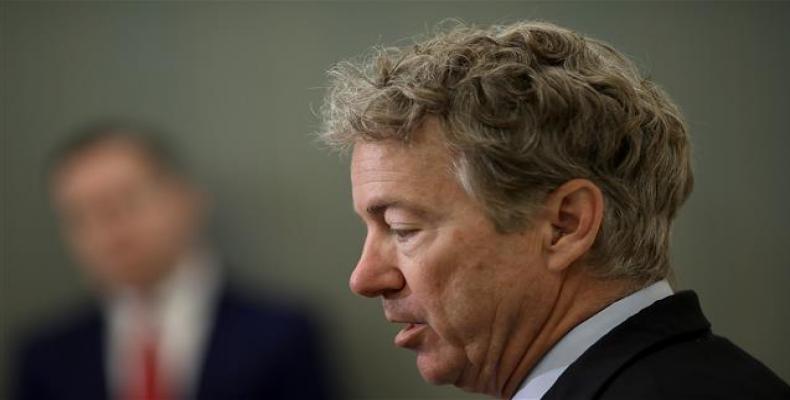بقلم: Pavel Jacomino
2018-04-19 14:50:58
Facebook
Pinterest
Telegram
Linkedin
WhatsApp

Washington, April 19 (RHC)-- The U.S. Senate has grilled officials of the Donald Trump administration over Washington's support for Saudi Arabia's war on Yemen, saying there's an “alarming absence of strategy” when it comes to the war.
During a Foreign Relations Committee hearing, senators from both sides of the aisle demanded answers from officials from the Pentagon and the Department of State. Republican Senator Rand Paul questioned vast U.S. arms exports to Riyadh. He said Saudi Arabia is attacking Yemenis indiscriminately, while the U.S. is increasing its bomb sales to the kingdom.
"If your son was shooting off his pistol in the backyard and doing it indiscriminately and endangering the neighbors, would you give him more bullets or less?" Paul asked at the hearing. "Our strategy is to give [the Saudis] more bombs, not less," he added.
Democratic senator Bob Menendez said there is an “alarming absence of strategy” in Washington’s approach to Yemen.
Trump administration officials defended U.S. support for the Saudi war on Yemen. Ambassador David Satterfield, the State Department's Middle East Envoy, claimed that "military support to the Saudi-led coalition supports important U.S. national security and diplomatic objectives.Ӎ
Saudi Arabia launched aggression against Yemen in March 2015 in support of the country’s former Riyadh-friendly government and against the country’s Houthi Ansarullah movement, which has been running state affairs in the absence of an effective administration.
The offensive has, however, achieved neither of its goals despite the spending of billions of dollars and the enlisting of Saudi Arabia's regional and Western allies.
The Yemeni Ministry of Human Rights announced in a statement on March 25 that the Saudi-led war had left 600,000 civilians dead and injured during the past three years. The United Nations says a record 22.2 million people are in need of food aid, including 8.4 million threatened by severe hunger.
A high-ranking UN aid official recently warned against the “catastrophic” living conditions in Yemen, stating that there was a growing risk of famine and cholera there.
During the Senate hearing on Tuesday, Satterfield claimed that if the United States ends its support, "the Saudis could well pursue defense relationships with countries that do not have an interest in ending the humanitarian crisis, minimizing civilian casualties, or making progress towards a political solution.”

